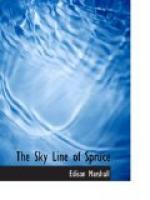Now that they climbed toward Spruce Pass their talk died away, and more and more they yielded themselves to the hushed mood of the forest. Their trail was no longer clearly pronounced. It was a wilderness thoroughfare in the true sense,—a winding path made by the feet of the great moose journeying from valley to valley.
Wild life became ever more manifest. They saw the grouse, Franklin’s fowl so well beloved by tenderfeet because of their propensity to sit still under fire and give an unsteady marksman a second shot. Fool hens, the woodsman called them, and the motley and mark of their weak mentality were a red badge near the eye. The fat birds perched on the tree limbs over the trail, relying on their mottled plumage, blending perfectly with the dull grays and browns of the foliage, to keep them out of sight. But such wiles did not deceive Ben. And once, in provision for their noon lunch, a fat cock tumbled through the branches at Beatrice’s pistol shot.
The pine squirrels seemed to be having some sort of a competitive field meet, and the tricks they did in the trees above the trail filled the two riders with delight. They sped up and down the trunks; they sprang from limb to limb; they flicked their tails and turned their heads around backward and stood on their haunches, all the time chattering in the greatest excitement. Once a porcupine—stupid, inoffensive old Urson who carries his fort around on his back—rattled his quills in a near-by thicket; and once they caught a glimpse of a mule deer on the hillside. This was rather too cold and hard a country, however, to be beloved by deer. Mostly they dwelt farther upriver.
All manner of wild creatures, great and small, had left signs on the trails. There were tracks of otter and mink, those two river hunters whose skins, on ladies’ shoulders, are better known than the animals themselves. They might be only patches of fur in cities, but they were living, breathing personages here. Particularly they were personages to the trout. Ben knew perfectly how the silver fish had learned to dart with such rapidity in the water. They learned it keeping out of the way of the otter and the mink.
They saw the tracks of marten—the mink that has gone into the tree tops to live; the doglike imprints of a coyote at which Fenris whimpered and scratched in excitement (doubtless wishing to run him down and bite him, as is the usual reception to the detested coyote by the more important woods creatures) and once the fresh mud showed that an old grizzly—the forest monarch, the ancient, savage despot of the woods of which all foresters, near and far, speak with deep respect—had passed that way but a few minutes before. Foresters both, the two riders had every reason to believe that the old gray tyrant was lurking somewhere in the thickets beside the trail, half in anger, half in curiosity watching them ride past. And of course the tracks of moose, and of their fellows of mighty antlers, the caribou, were in profusion.




